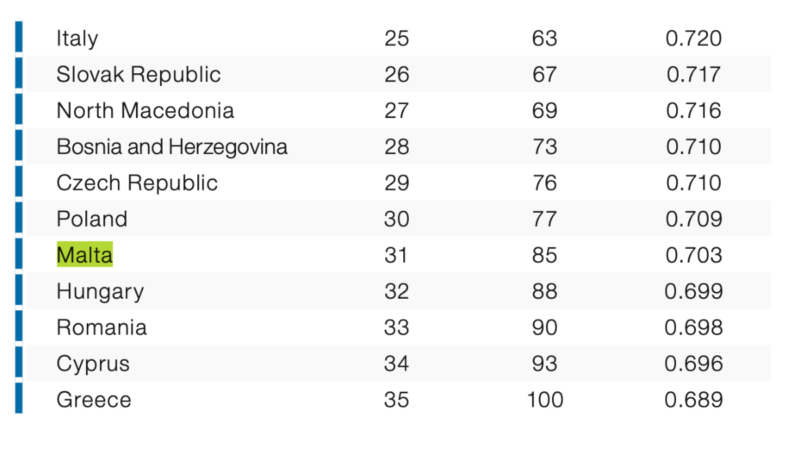News
A man stands in Valletta. Photo: Marc Kleen
The disparity between men and women in Malta – specifically regarding economic opportunities, health and leadership – remains glaringly wide, both on a European level and a global level, the latest Global Gender Gap Report published by the World Economic Forum confirms
On a global level, Malta ranked 85th out of 146 countries, falling one place since 2021 and rising five places since 2020. The main factors contributing to such a wide gap include reproductive autonomy, salary disparity and female representatives in leadership roles.
Among European countries, Malta placed 31st out of 35 countries, above Hungary, Romania, Cyprus and Greece.

Malta ranked 31st in Europe out of 35 countries. Source: World Economic Forum report
Globally, the countries that ranked better than Malta include the United Arab Emirates, Kazakhstan, Bangladesh, Ethiopia, Poland and Botswana.
A deeper dive into the categories contributing to the overall result shows that Malta’s weakest spot is in the jealth and survival category (106th place globally). The report notes that when it comes to reproductive autonomy, men and women have unequal rights. Though it is not stated in the report, this is probably linked to Malta’s strict abortion laws, which, just last June, resulted in an American tourist having to be airlifted to Spain to terminate an unviable pregnancy.
The country also ranked poorly in economic participation and opportunity (89th) and political empowerment (82nd). In stark contrast, Malta ranked 1st, together with another 20 countries, in the ‘educational attainment’ category.
Within the political empowerment category, Malta ranked 123rd out of 146 countries for the parliamentary participation of women. The research was conducted before the 2022 general elections, which saw a rise in parliamentary representation through the controversial gender mechanism.
In economic participation and opportunity, Maltese women continue to experience a significant disparity in salaries. While the estimated earned income of men is $49,040 (€48,082), that of women is $30,880 (€30,277).
Additionally, the report shows that while male legislators, senior officials and managers make up 71.48% of the workforce, women in the same positions make up 28.52%.
Regarding education, Malta boasts a higher number of women than men in secondary (+0.27) and tertiary education (+21.92).
According to the report, in 2022, the global gender gap was 68.1%. At the current rate of progress, it will take 132 years to reach full parity. Iceland, Finland, Norway and New Zealand held the top spots in the ranking with the narrowest gender gaps.
Women’s employment status a risk factor for psychological violence
A separate report on psychological violence and coercive control published by the European Institute for Gender Equality (EIGE) in July states that the employment status of both victims and perpetrators in relationships can be a risk factor for psychological violence and points to research in Malta as an example.
While a study in Spain found that women’s economic dependency on their partner might hinder their ability to leave a relationship, a study in Malta, titled ‘Intimate Partner Violence: Psychological and Verbal Abuse during Pregnancy’ found that unemployment, in the case of either the pregnant woman or the partner, is a predictor for psychological violence against the woman in the relationship.
The report also notes how, in some EU countries, a lack of understanding of what constitutes psychological violence is also prevalent. In Malta, a study drawing on interviews and focus groups with victims of psychological violence and professionals found that cultural factors resulted in a lower degree of awareness and understanding of psychological violence, reducing the likelihood of victims reporting such crimes to the authorities.
The report notes: “This research suggests that women victims lack an understanding of what constitutes psychological violence and/or coercive control.” Although increased criminalisation measures are starting to be put in place, “more needs to be done.”
As it stands, the statistics are “stacked in a grim reality,” EIGE said, with data from the EU Agency for Fundamental Rights (FRA) showing that across the EU, 44 % of women have experienced psychological violence from a partner in their lifetime.
The Institute defines coercive control as “a strategic course of oppressive conduct typically characterised by frequent, but low-level physical abuse and sexual coercion in combination with tactics to intimidate, degrade, isolate and control victims”, and psychological violence as “any intentional course of conduct that seriously impairs another person’s psychological integrity through coercion or threats.”
Sign up to our newsletter
Stay in the know
Get special updates directly in your inbox
Don’t worry we do not spam
